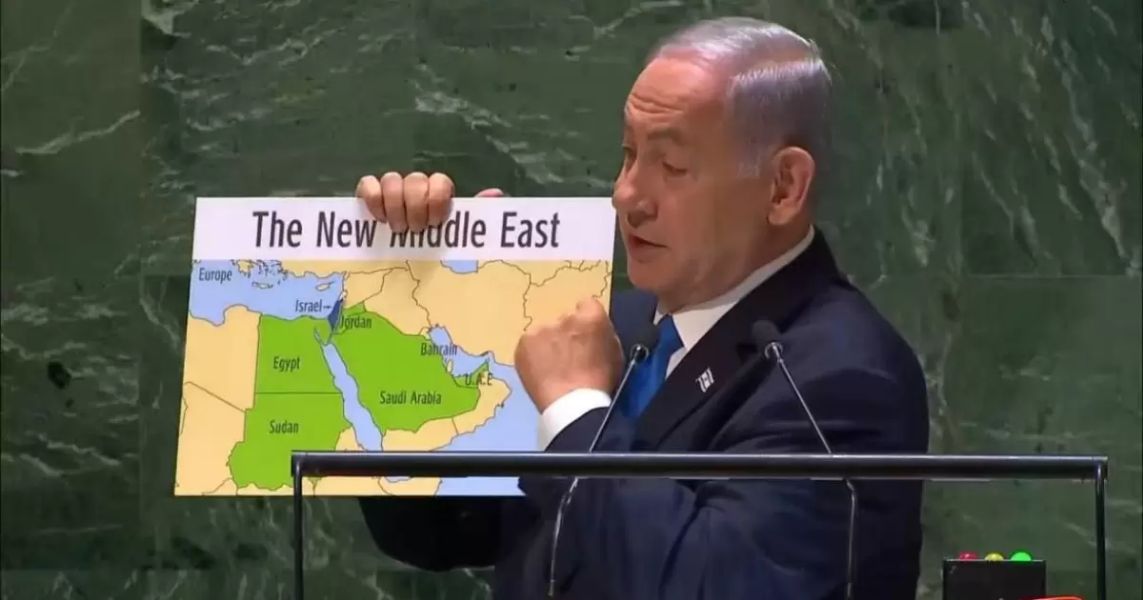
-
Published: 23 September 2023

During his speech at the 78th Session of the UN General Assembly, Israeli Prime Minister Benjamin Netanyahu showed a map of what he called the "new Middle East" countries, namely Egypt, Sudan, the United Arab Emirates, Saudi Arabia, Bahrain and Jordan, while the map did not include any mention of the existence of a Palestinian state .
Edited by| Hugh Gey
Politic section - CJ journalist
New York – September 23,2023
Israeli Prime Minister Benjamin Netanyahu delivered a speech to the UN General Assembly at its 78th session, focused on the prospects and effects of normalization and peace with Arab countries, and his role in changing the Middle East.
The map shown by Netanyahu included areas covered in dark green for countries that have peace agreements with Israel or are in negotiations to conclude peace agreements with Israel.
The areas covered in green included the countries of Egypt, Sudan, the United Arab Emirates, Saudi Arabia, Bahrain and Jordan, but they did not include any mention of the existence of a Palestinian state, as the blue color, which bears the word Israel, overshadowed the map of the entire occupied West Bank, including the Gaza Strip.
After delivering his speech at the United Nations, Netanyahu tweeted on his X-site account and wrote: "the greatest achievement in my life is to fight for you (the Israeli people) and for our country. Young women of Shalom."
While analysts saw that Netanyahu's incident repeats the controversy that caused criticism of Israeli government finance minister Bezalel Smotrich, when he presented a map of Israel in Paris but with the annexation of Jordan and the Palestinian territories, and commented:" There is no such thing as the Palestinian people, an imaginary invention that has not exceeded 100 years old, " something that provoked outrage at the popular and diplomatic levels.
Israeli media said on Friday that Netanyahu was " lying "about the map he presented to Israel before the UN General Assembly, because" there is no place for a two-state solution", to raise questions about"which side he wants to make peace with".
In his speech to the General Assembly, Netanyahu said that his country is approaching the signing of a peace agreement with Saudi Arabia, considering the Brahimi agreements as a "historical turning point", and stressed that his country "shares many interests with several Arab countries".
Netanyahu stressed that the signing of a peace agreement with Saudi Arabia will change the entire map of the Middle East and create a new Middle East, adding that this can be achieved under the leadership of US President Joe Biden.
He also confirmed that he had discussed with Biden two days ago a "vision for peace," without specifying whether this vision would include a solution to the Palestinian issue or not.
The Israeli prime minister also stated that "the Palestinians will greatly benefit from achieving peace in the region and should be part of it, adding that reaching peace with Arab countries will increase the likelihood of achieving peace between Israel and Palestine".
Speaking to the General Assembly, Netanyahu said that "peacemaking efforts have not succeeded in the past, because they were based on the wrong idea that Arab countries will not normalize their relations with Israel if a peace agreement with the Palestinians is not concluded first".
Over the past four years, Israel has concluded four peace agreements with the United Arab Emirates, Bahrain, Sudan and Morocco.
{source}<script async src="https://pagead2.googlesyndication.com/pagead/js/adsbygoogle.js?client=ca-pub-4474625449481215"
crossorigin="anonymous"></script>
<!-- moss test ad -->
<ins class="adsbygoogle"
style="display:block"
data-ad-client="ca-pub-4474625449481215"
data-ad-slot="6499882985"
data-ad-format="auto"
data-full-width-responsive="true"></ins>
<script>
(adsbygoogle = window.adsbygoogle || []).push({});
</script>{/source}
